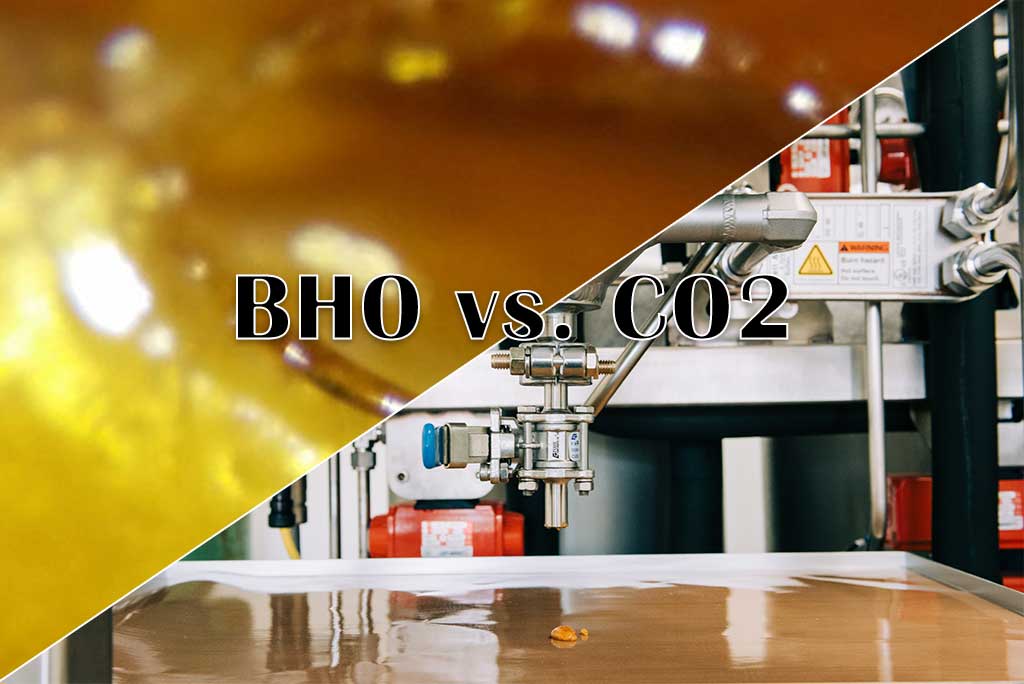
The extraction process for cannabis concentrate is a complex and often misunderstood subject, solvent-based extraction is the most viable and efficient method for commercial purposes. What is the optimization solvent for hemp/CBD extraction? The two most popular solvents are light hydrocarbons (butane and propane) and carbon dioxide (CO2), it’s essential to understand the differences between butane hash oil (BHO) and carbon dioxide extraction. Let’s take a look at how they both compare in terms of hemp extraction for CBD.
BHO vs. CO2 Extraction: What’s the Difference?
There are many misconceptions about the oil that’s processed to create cannabis concentrates. Both Butane Hash Oil (BHO) and CO2 Oil are made using solvents (butane or carbon dioxide in its “critical” or liquid state) to extract THC and other cannabinoids and terpenes from plant material.
CO2 Extraction
CO2 extraction, also known as supercritical CO2 extraction, is an increasingly popular method used to extract essential oil. The extraction process is also used in cannabis compounds from raw cannabis material or trim.
Closed-loop CO2 equipment uses the naturally occurring, odorless, and colorless CO2 compound that is capable of dissolving plant resin from the plant. Using critical temperatures and pressures, the CO2 compound converts into a supercritical state and adopts gas and liquid-like characteristics.
This supercritical CO2 solvent acts as a gas by filling in every nook and cranny of an extraction tube. CO2 also retains a liquid-like density that is powerful enough to wash away cannabinoids and terpene compounds.
BHO Extraction
Hydrocarbon extraction uses hydrocarbons such as butane or propane to dissolve hemp’s trichomes. This method is one of the most frequently used and effective extraction methods, and not just for hemp or cannabis.
The hydrocarbon extraction process involves placing the hemp material into a pressure vessel. Butane or propane are introduced to the vessel to extract the cannabis oils in a quick and efficient manner. The cannabinoid-rich solution is then moved to another vessel where butane and propane are separated from the oil. After the butane has been recovered back to the supply tanks, a final purge can leave behind a pure and potent product.
Which Provides Full-Spectrum Products? BHO vs. CO2
BHO is a solid choice for industrial hemp extraction. One of the most exciting and innovative features afforded by BHO extraction is the ability to reap a larger concentration of terpenes and other minor compounds. CO2 extraction methods can be efficient at crafting an odorless and tasteless cannabis distillate, but so can BHO. In addition, BHO extraction enables manufacturers to produce high-cannabinoid and high-terpene full-spectrum extracts.
Which Provides the Cost-Effective and Safe? BHO vs. CO2
In layman's terms, you can do CO2 extraction at home. But do not try to extract Hash oil at home without a professional knowledge base and adequate safety measures.
A lot of people have blown up their houses already, and I think that should be a valuable lesson.
CO2 extraction is a generally safe and effective solvent, but so is hydrocarbon-based extraction.
As the cannabis extraction sector has become more regulated, building and equipment guidelines for hydrocarbon-based extraction ensure the new technology keeps employees and consumers safe.
CO2 is a worthy alternative to other popular solvents, but BHO ends up winning in the end as one of the most versatile, efficient, and safe solvent options available. Closed-loop BHO extraction equipment has improved exponentially over the years in terms of safety and throughput capacity. Modern BHO equipment is outfitted with automated ventilation, cooling, and higher yields.
Source: https://precisionextraction.com/2021/06/bho-vs-co2-extraction-which-is-better/
https://blog.lunatechequipment.com/bho-vs-co2